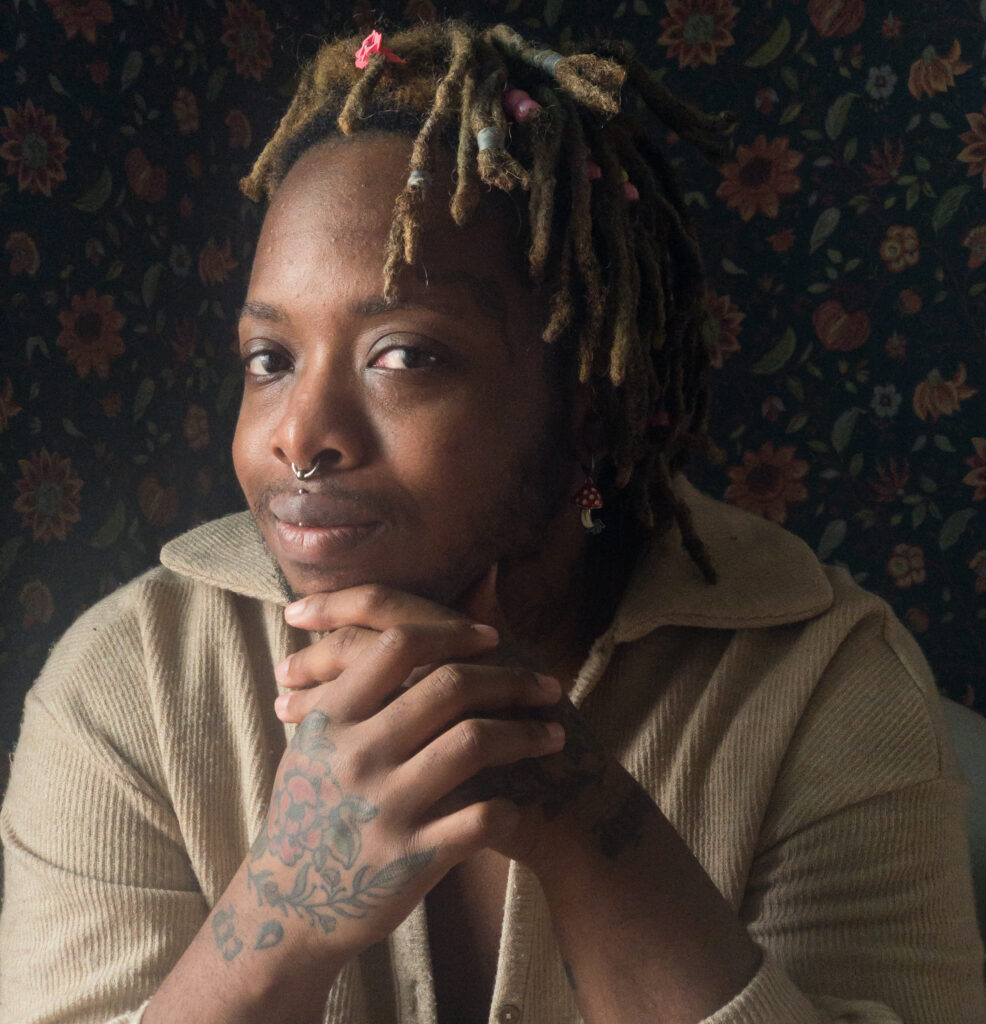Anaïs Duplan is a trans* poet, curator, and artist. He is the author of the newly released book I Need Music; a book of essays, Blackspace: On the Poetics of an Afrofuture; a full-length poetry collection, Take This Stallion; and a chapbook, Mount Carmel and the Blood of Parnassus. He has taught poetry at the New School, Bennington College, Columbia University, and Sarah Lawrence College. As an independent curator, he has facilitated curatorial projects in Chicago, Boston, Santa Fe, and Reykjavík. He was a 2017–2019 joint Public Programs fellow at the Museum of Modern Art and the Studio Museum in Harlem, and in 2021 received a Marian Goodman fellowship from Independent Curators International for his research on Black experimental documentary. In 2016, he founded the Center for Afrofuturist Studies, an artist residency program for artists of color, based at Iowa City’s artist-run organization Public Space One.
***
From “Making Use of the Mundane: Black Performance & Becoming”:
Growing up, I rationalized my father’s absence with ideas about gender norms. I thought that men, since they are more powerful, didn’t have to have any obligations to other people. I thought that I, too, wanted to not have obligations to other people. I internalized a concept of feminine love as that which either perfectly complements or perfectly emulates the love-object. Both versions are traps.
In certain ways, having power projected onto you is as asphyxiating as having powerlessness projected onto you. The primary difference is that having powerlessness projected onto you puts you into danger that having power projected onto you doesn’t. Having obligations to other people is part of the beauty of being human, but our connections have to be chosen, not imposed. For a long time, I thought the only way to freely choose anything was as a man.
The truth is, freedom is the most mundane thing imaginable but it’s also hard to locate and it’s rarely “pure.” All marginalized people inhabit two worlds at the same time: those of freedom and nonfreedom. Being unfree is different than being in bondage. In bondage, as in the case of enslavement, one’s body is owned by someone else. Being unfree, on the other hand, is what happens after the end of enslavement: one becomes an “emancipated” citizen in the society that used to enslave her and that is still built to do so—without a literal title on one’s body, but still with the power to destroy that body, threaten it, circumscribe it, categorize it, and imprison it.
Should we, “post-bondage,” focus on the ways in which we’re free (free to move, free to buy, free to breathe) or the ways we’re not free (free to move but displaced and shuffled around, free to buy but within a capitalist system in which one used to exist as commodity, free to breathe but in especial danger at all times)? Neither. In order to locate liberation, one has to locate a third space. This alter-space is not “outside of,” “away from” or “other than” our present world. Instead, it is an intensification, or deepening, of mundane reality.
***
From “Paradigms for Liberation”:
Adrian Piper took photos of her naked body while reading The Critique of Pure Reason to make sure her body was still there. I don’t want to talk about “the black body.” Where is such a thing? I am not inside of anything. I want the monad. I want integration, but not the kind that requires “white” and “black” to participate. Integration as the move from a dualist Cartesian world to the monist’s world, so that transcendence is a misnomer—there being nothing to get beyond, to get above or around. In this single world-substance, everywhere is home; everything is forever; and everyone is inalienable.
***
From “Blackspace”:
To propel myself is to stand for something else besides this world as a terrible, terrible place. To go further than my idea of myself extends.
There is the happiness I feel within the limits of my current self-conception, then there’s the happiness of seeing my self-conception has fallen apart, yet another time. The former kind of happiness happens when reality aligns with my opinions about how the world ought to be. The latter happens when my beliefs about how the world ought to be are destroyed by an inescapable reality. The latter kind of happiness is always precipitated by intense fear.
When this kind of world-shattering happiness takes place, beauty itself runs out and there’s only after-beauty. Language runs out and there’s after-language. After runs out—
I was taught from a young age it was important to perform. As I work through my taboos, letting go of performance is most difficult.
Even “forward” seems to fall apart. What I am is what is the future.
from The Paris Review https://ift.tt/Vmg5Jcu

Comments
Post a Comment